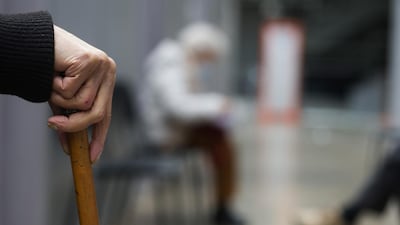Among the 2.27 million people globally who have died of Covid-19 in the last year, countless families have lost a beloved elderly relative. Even as vaccines are being rolled out, the lives of precious grandparents and parents are still at risk – or being lost to the virus, causing widespread and unexpected sorrow for families across the world.
When we lose older people, we are bereft of not only their company but also a part of our own personal histories. Narratives that shape younger generations recede into the background. Which is one reason why it is so important right now to record our oral histories while we still have time.
Life for so many people seems to have slowed during the lockdown. And as restrictions endure in so many countries, storytelling can be a way to fill our days with meaning. It is good use of time to examine important questions: how did we get here, what shaped our families, our culture, our personalities? Oral histories of families will rarely be captured by the grand sweep of history text books. But in terms of placing ourselves in a context, family stories will arguably always have more meaning to us than any formal records.
There is a modern trend to get DNA tests done to find out about our ancestry. But why start so far? What about the stories that surround us and we don’t know anything about? When will we have this much time and opportunity to explore those?
Even as adults, we often need to create our own worlds. From time to time we all need solace, and not just when we are bereaved. Hearing family anecdotes passed down from generations addresses that need in us all. It is wise to capture the stories while we have our loved ones, rather than mourn them when it is too late. There is no time like the present to ask our elders about their lives and listen to their experiences, their memories of the people who shaped them and made them who they are.

In the last year, many children have had limited access to grandparents, uncles, aunts – all of whom help establish their place in the world. These bonds would normally be built by social events and community interactions, which have been drastically cut.
Recounting stories is a powerful way to recreate these essential bonds between younger generations and elders, bonds that may have been fractured by the distance caused by Covid-19. Which child doesn’t love to hear stories? And which grandparent doesn’t love to see the wonder on the faces of the young? It just needs a prompt for them to open up to each other. Storytelling sessions are one way to make children understand that ‘old’ people too have lived rich lives. That they have experienced adventures and feelings we may not necessarily associate with them. Oral histories carry immense value. And talking about the past, being together and handing down family lore establishes a healthy understanding of age and perspective.
This is good for children and it helps the elderly feel wanted and loved. For many people, memories of their younger years are often their strongest and they become most animated when telling them. Engaging our elders in conversation is a way to help them through feeling low during lockdown. And often, such conversations require sensitivity and courage, especially if family histories open old wounds. Stories of war, partition, displacement, suffering and loss are not easy to delve into. But broaching these topics, showing interest, engagement, can bring great joy, mutual respect and a sense of well-being to families.
Such projects – creating records of our elders, filming them being nostalgic about their youth – are a great boon. Often this documentation is a balm when families lose their elders. Often this documentation is a balm when families lose their elders. And the records we keep now can benefit future generations in the family.
The child who might have been unborn – or too young when he lost his grandparent – might grow into a teenager who wants to know what his nana was like in her twenties. One could start by drawing family trees and sorting out those sepia-tinted family photographs that one always intended to digitise or by salvaging old VHS tapes and projector reels.
Young children can begin by asking their parents or grandparents to describe what they were like at their age and what they did for fun. Older and adult children can probe further, about challenges the elders faced when they were making their way in the world, or what was happening in the world at the time, what were the most exciting and most difficult things they faced, and so on.
Children and grandchildren need to be nourished by understanding their roots. To leave them with a vacuum about their histories is to render them with an incomplete upbringing. Storytelling within families allows us to see our elders in a different light, as people who had dreams, aspirations and challenges that might be unimaginable in today's context. Their stories might even explain some of their thinking and behaviour. With any luck, it might lend us insight into how we create our own future histories by understanding our past.
Shelina Janmohamed is an author and a culture columnist for The National


